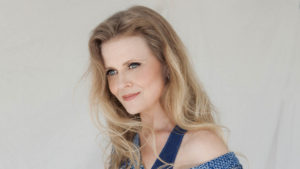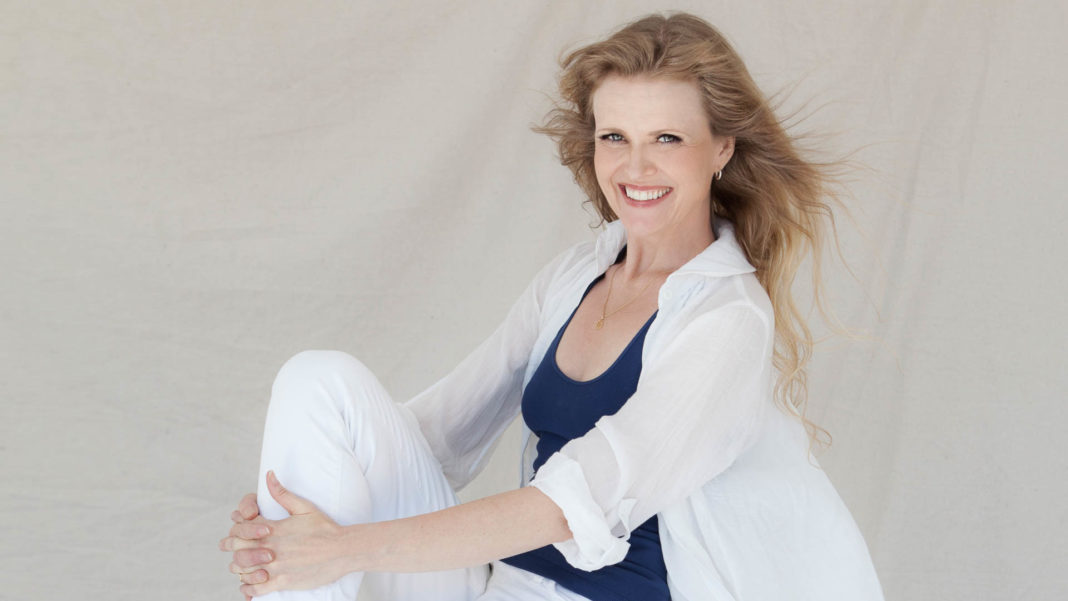Tierney Sutton was up early today. She had just flown back to Los Angeles after a series of shows in Beijing. So when we spoke she readily admitted she didn’t know exactly what time zone she was in or what she was doing up so early. Of course, she was talking about her gig on Thursday night at the blue whale in Little Tokyo where Sutton will be joined by pianist Tamir Hendelman for an intimate evening of music.
In addition to Thursday’s show at the blue whale, The Tierney Sutton Band has a free concert on the Argyros Plaza at the Segerstrom Center for the Arts in Costa Mesa on July 27th. Two days later she and her band will be participating in the Central Avenue Jazz Festival. In other words, there are ample opportunities to see and hear Sutton perform.
Sutton has eight Grammy nominations. Her albums The Sting Variations, Paris Sessions, After Blue, American Road, Desire, On the Other Side and I’m With the Band all received nominations for Best Jazz Vocal Album. She wrote music for Clint Eastwood’s film Sully and her songs have been heard in multiple films and television shows.
We spoke about her approach to Thursday’s intimate show, the nature of the music business and how it impacts jazz artists in particular and why she considers Los Angeles not just her home, but also her creative home.
What makes your collaboration with Tamir Hendelman unique?
Tamir is a unqiue individual as anybody who has ever heard him play knows. He has a tremendous amount of energy and he’s a brilliant technician and an amazing player and arranger. It’s very free because he knows a bajillion songs. If I throw out a song we can do it on the spot. We will probably have real improvisational moments in the show if someone shouts out a request. I suspect it will be the most fun stuff we do, particularly when you have somebody that can react as quickly and fluidly as Tamir can.
Taking requests from the audience? That’s a test of nerves and skill isn’t it?
If you want to keep the energy of jazz in your live performance, that’s a really good thing to have it slap you in the face and keep you comfortable being uncomfortable. There’s such energy in doing something outside your comfort zone, but relying on the musicality and energy of your musicians to bring it to the table. You can’t get that anywhere else.

You don’t have a new album out to promote. What are you planning for this show at the blue whale?
This will be duo stuff with Tamir – his arrangements. Tamir and I will probably record at some point. We’re just creating the music right now. We both love Brazilian music and [Antonio Carlos] Jobim. We’re looking at standards and we are doing mini-thematic groupings of songs based on a composer.
From an audience point-of-view there’s something really amazing about the simplicity of a vocalist and a piano. What is that perspective like from the singer’s point-of-view?
There’s defiitely something to what you are saying. The idea of taking material and getting it down to the bare essentials and getting it to bare bones. Here is this song I love. Here is this melody. Here is this story. Even though I love working with the whole band, there’s something about working with one person where you can really hear everything. Everything is exposed.
What’s your view of the jazz scene in Los Angeles?
I think it is a pretty happening scene actually and it gets more happening in a way. There are just so many great musicians here. The bench of great musicians is unending. It’s just an amazing place to be a musician. The audience side of that question is a little tough because everybody is distracted with a lot of different things. Venues are addressing that by creating a scene where musicians want to hang out. Jazz has always been a niche audience, but it’s in this town and it has its role and it’s not going anywhere.
I recently spoke to our lady j who commented that the “music industry isn’t even supporting music these days.” If jazz is a niche genre, how does the upheaval in the industry impact you?
Well the good news about being a jazz musician is it has always been like that for us. We’ve had to tour to make a living. We’ve had to be creative. It’s totally the wild west out there right now in terms of what to do with records. When the rubber hits the road you have to fall in love with the doing of the work and the creating of the work. That’s a lesson I learned from Clint Eastwood. If you just fall in love with the process you’ll be okay. If you fall in love with some imagined results or recognition you are screwed.
Ella Fitzgerald once said that she tries “to find out the new ideas before the others do.” How important is finding new ideas for you and how does that influence the choices you make?
That’s a really great question. I think the nature of the work of jazz and jazz musicians is always finding a new idea to organize your work. Having a focus and having something to inspire you is really key – something outside yourself. And for me that’s working with different musicians like Tamir. He’s bringing something to the table that’s different. My number one job will be listening to him and figuring out what his voice is and interacting with it and being influenced by him. I don’t think I’m conscious of it the way Ella was saying, but there is something of alright, what’s next? What does Bob Dorough say in “Devil May Care?” “No cares and no woes, whatever comes later goes. That’s how I’ll take and I’ll give. Devil may care.”
Photos courtesy of Unlimited Myles.











